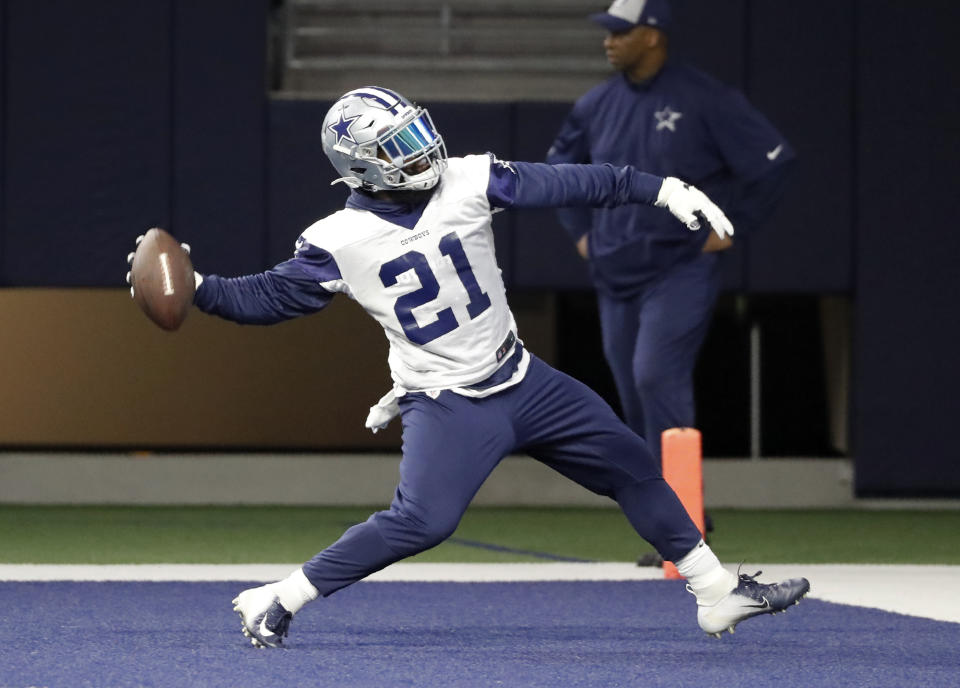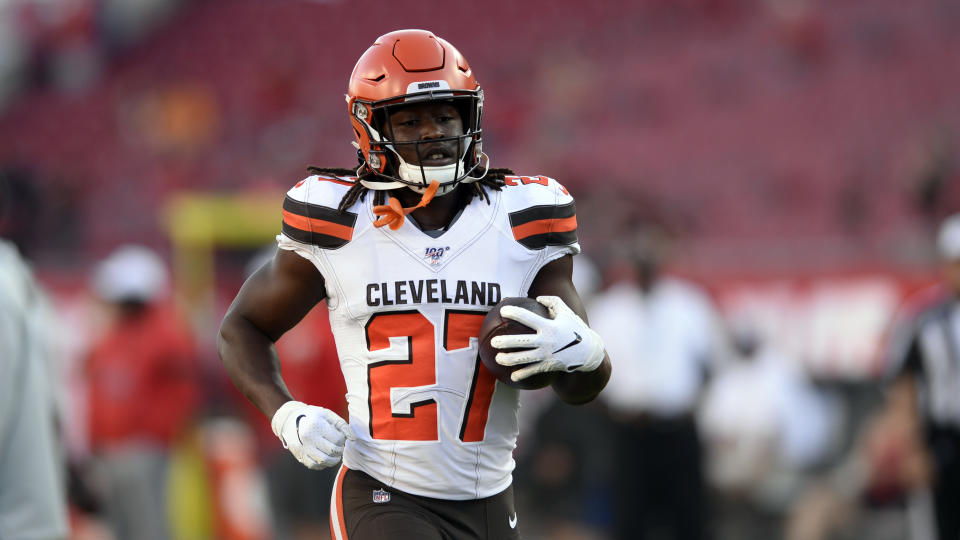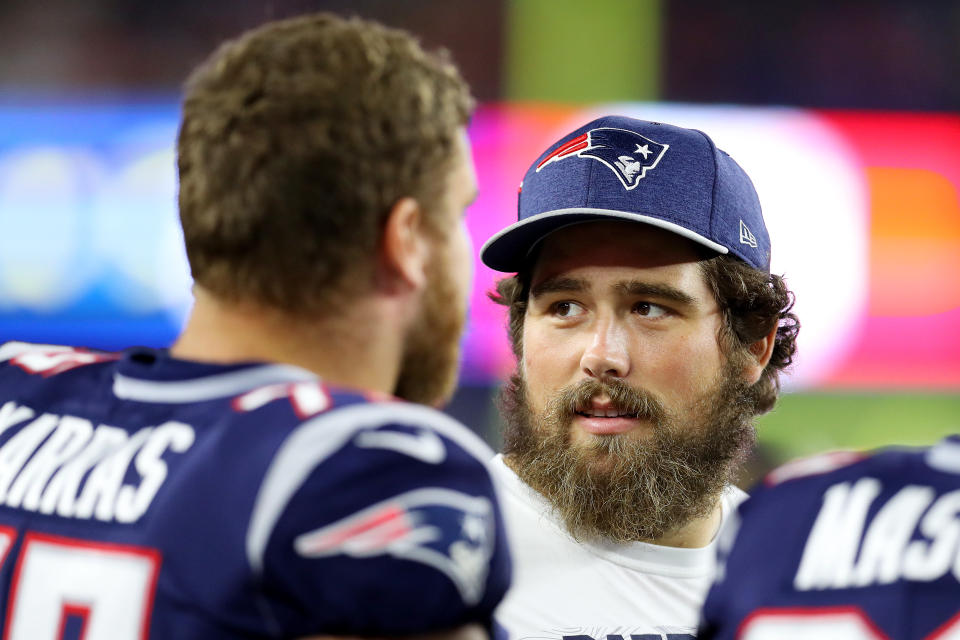NFL 2019: The most impactful holdouts, suspensions and injuries
We’re just three days from the start of the 2019 regular season, and numerous key players either have yet to join their respective teams, will miss time due to suspension or will miss time because of injury.
Here’s a rundown of each category:
Holdout players
RB Ezekiel Elliott, Dallas Cowboys
Elliott has two years remaining on his rookie contract but feels he’s earned an extension and likely doesn’t want to be in the situation Le’Veon Bell was in with the Pittsburgh Steelers: franchised two years in a row, metaphorically run into the ground with no longer-term security, and then released into free agency potentially as damaged or at least overused goods.
Cowboys owner/GM Jerry Jones has expressed confidence that a deal would get done with Elliott, but both he and his son Stephen have taken a couple of unnecessary shots at Elliott and agent Rocky Arceneaux. The offer on the table for Elliott would make him the second-highest paid running back in the league behind Todd Gurley, but he’s pushing to be highest paid. There was progress over the weekend, per Yahoo Sports’ Charles Robinson, but as of Monday morning a deal hadn’t been completed.

RB Melvin Gordon, Los Angeles Chargers
Gordon is headed into the fifth and final year of his rookie contract, the option year. Similar to Elliott, he’s likely not a fan of the idea of playing without the security of a long-term deal when he’s averaged between 19 and 22 touches per game over the last three seasons.
But unlike Elliott, Gordon and his agent made it clear from the outset: pay me fairly or trade me to someone who will. Thus far, neither has happened. And the Chargers said they won’t be negotiating any more this season, complicating the situation.
OT Trent Williams, Washington
Williams’ situation is unique: He’s under contract and is among the highest-paid players at his position. According to reports, the veteran tackle hasn’t reported to Washington over his general mistrust of the organization and discomfort with the team’s medical staff, whom he feels mishandled a lump he found on his head last year. (Williams has since had the growth removed, and it was found to be benign.) Recent reports said Williams won’t play for Washington again “period,” citing sources close to the Pro Bowler.
Despite team president Bruce Allen’s insistence that Williams will play for Washington again and Washington not wanting to trade him, it will be interesting to see how – or if – this is resolved.
Suspended players
Cleveland WR Antonio Callaway, four games (substance abuse)
A fourth-round pick last year due to other off-field questions, Callaway showed that teams were right to wonder if he was worth taking a gamble on. On August 9, the Browns announced that Callaway will miss the first four games of the season for violating the league’s policy on substances of abuse. Along with a statement from Callaway that he’s “taken steps to make myself better,” general manager John Dorsey expressed disappointment in the 22-year-old.
Kansas City CB Mo Claiborne, four games (substance abuse)
Clairborne was a free agent for months, and many wondered why, since he’s been a solid corner with Dallas and the Jets. Then came the answer: He was facing a four-game suspension for substance abuse. But the Kansas City Chiefs signed Claiborne in August, content to wait to see how he can help their team.
Jets TE Chris Herndon, four games (substance abuse)
Herndon’s suspension is tied to a June 2018 arrest for driving under the influence – he crashed into a 76-year-old man and flipped his SUV. Neither man was seriously injured, but one witness said Herndon was driving 100 miles per hour. After a promising rookie season, Herndon’s second season will have a delayed start.
Cleveland RB Kareem Hunt, eight games (personal conduct)
Hunt’s punishment is for multiple infractions. There’s video of him shoving and kicking at a woman in a Cleveland apartment building in February 2018, and he also allegedly punched a man at an Ohio resort a few months later. The NFL won’t allow Hunt to be at the Browns’ facility during his suspension.

Oakland OL Richie Incognito, two games (personal conduct)
Since he last played a game in 2017, Incognito has been involved in at least two violent incidents: he threw a dumbbell at a man in a gym in May 2018 and screamed at the man to “get off my [expletive] playground”
Tennessee OT Taylor Lewan, four games (performance-enhancing drugs)
Lewan also announced his own suspension, and he also said his failed test was for ostarine, which he said came from a bad batch of nutritional supplements. In an emotional video, he said he would take a polygraph test to support that he didn’t knowingly take the substance; the NFL denied Lewan’s appeal in late August.
Arizona CB Patrick Peterson, six games (performance-enhancing drugs)
Why did Peterson receive six games instead of the four games we usually see for PED offenses? Under the terms of the collective bargaining agreement, players get six games when there’s evidence that steps were taken to manipulate results (i.e. a diuretic or masking agent). Peterson has never before missed a game in his career, and his streak of Pro Bowls – he was chosen each of his first eight NFL seasons – will come to an end as well.
Dallas DE Robert Quinn, two games (performance-enhancing drugs)
Quinn’s agent, Sean Kiernan, was highly critical of the player’s suspension, saying the NFL was “tone deaf” in its argument in front of the arbitrator during the suspension hearing. According to Kiernan, Quinn’s steroid test in April showed trace amounts of probenecid, far below the threshold numbers that would have shown up if Quinn was using the drug as a masking agent. Probenecid is used to treat gout, and Kiernan said the pharmacy that administered Quinn’s approved seizure medicine filled an order for probenecid immediately before, contaminating Quinn’s medicine.
Seattle DT Jarran Reed, six games (personal conduct)
Reed’s suspension is tied to an April 2017 incident in which a woman claimed Reed had assaulted her; police did not arrest or charge Reed in the case, but two years later the NFL suspended the 2016 draft pick.
Giants WR Golden Tate, four games (performance-enhancing drugs)
The CBA doesn’t mandate that substances players are suspended for be revealed, though players can reveal the circumstances if they choose. Tate said he appealed the decision of his suspension because it came from his use of a drug prescribed to him by a fertility specialist; Tate said he stopped using the drug as soon as he realized it contained a banned substance and reported the situation to the league. He was suspended nonetheless.
New England TE Benjamin Watson, four games (performance-enhancing drugs)
Watson took to Facebook in May to announce his suspension. The veteran explained that he believed the 2018 season was going to be his last, and not long after began taking a “bio identical testosterone cypionate” to aid healing after the rigors of not just his last season with New Orleans but the cumulative effects of 15 years in the NFL. When the Patriots lured him back – the team drafted him in 2004 – it did so knowing he would miss four games.
Injured players
New England C David Andrews, blood clots
The Patriots’ starting center since he joined the team as an undrafted rookie in 2015, Andrews’ situation goes far beyond his ability to play football. He was hospitalized last month with blood clots in his lungs and could miss the entire season, though that seems secondary to his long-term health.

Carolina K Graham Gano, knee
It’s unknown how much time Gano will miss, though there was a recent report that he’s a candidate for short-term injured reserve because his knee isn’t showing improvement.
Cincinnati WR A.J. Green, ankle
Green underwent ankle surgery in late July and is expected to miss “multiple” regular season games, though it’s unclear how many that will be. Coach Zac Taylor said the Pro Bowler will return when “he’s healthy and ready to go.”
Houston RB Lamar Miller, torn ACL
Miller was lost for the season when he suffered a torn ACL in the Texans’ preseason game against Dallas. The veteran back was a Pro Bowler for the first time in his career last season, after totaling 1,136 yards from scrimmage and six touchdowns.
Chargers OT Russell Okung, pulmonary embolism
Similar to Andrews, Okung’s health scare goes beyond football. When training camp began, Okung revealed that he’d suffered a pulmonary embolism in June, and likely saved his own life by going to an urgent care facility and not ignoring his chest pain. It’s unclear when he will return to the field.
Tampa Bay DE Jason Pierre-Paul, neck fracture
Buccaneers medical staff and independent doctors cleared Pierre-Paul on August 27 to begin rehab after he fractured his neck in a car crash on May 2. Pierre-Paul, who had 12.5 sacks in 2018, lost control of his car in rainy conditions. His timeline still puts him on a path to miss the first month of the regular season.
Jets LB Avery Williamson
Expected to be one of the Jets’ defensive leaders on a unit in need of them, Williamson suffered a torn ACL against Falcons backups in New York’s second preseason game. Coach Adam Gase later took the blame for Williamson’s injury, acknowledging the inside linebacker and signal-caller shouldn’t have been on the field.
More from Yahoo Sports:


